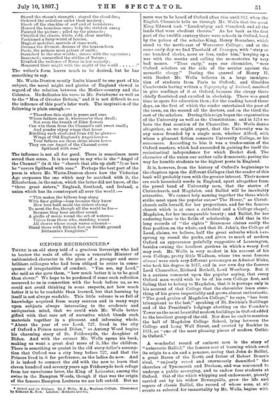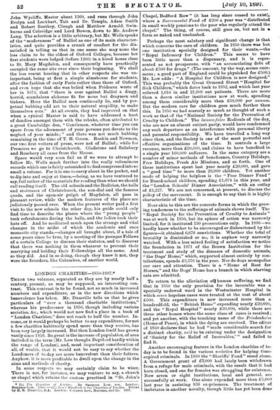OXFORD RECHRONICLED.*
THERE is an old story told of a gracious Sovereign who had to bestow the seals of office upon a venerable Minister of unblemished character in the place of a younger and more brilliant colleague who had been obliged to retire in conse- quence of irregularities of conduct. "You see, my Lord," she said as she gave them, "how much better it is to be good than clever." We hope to be pardoned if some such reflection occurred to us in connection with the book before us, as we could not avoid thinking in some respects, not how much better it is to be readable than learned, but that learning by itself is not always readable. This little volume is so full of knowledge acquired from many sources and in many ways upon subjects always interesting to the academic and antiquarian mind, that we could wish Mr. Wells better gifted with that rare art of narrative which blends such materials together in a pleasant and informing whole. "About the year of our Lord, 727, lived in the city of Oxford a Prince named Didan," so Antony Wood begins his charming story of St. Frideswyde, the daughter of Didan. And with the extract Mr. Wells opens his book, making us want a great deal more of it, like the children. There is something so quaint in the old story-teller's assump- tion that Oxford was a city long before 727, and that the
Princes lived in it for preference, as the ladies do now. And it is indeed to connect the old with the new to learn that eleven hundred and seventy years ago Frideswyde took refuge from her unwelcome lover, the King of Leicester, among the swine in the Bampton Woods, though if that was the origin of the famous Bampton Lectures we are left untold. But no
• Orford and its Colleges. By J. Wells, M.A., Wadham College. Illustrated by Edmund H. New. London: Methuen and Co. more was to be heard of Oxford after this until 912, when the English Chronicle tells us through Mr. Wells that the great King Edward took " Lundenbyrg and Oxnaford, and all the lands that were obedient thereto." As far back as the first part of the twelfth century there were schools in Oxford, hard by the palace of the scholar-King, Henry Beauelerc, which stood to the north-east of Worcester College ; and at the same early day we find Theobald of Etampes, with "sixty or one hundred clerks, more or less, under him," keeping up a war with the monks and calling the monasteries by very bad names. "Thus early," says our chronicler, "were Oxford scholars on the side of the secular against the monastic clergy." During the quarrel of Henry II. with Becket Mr. Wells believes in a large immigra- tion of students from Paris to Oxford ; and Giraldus Cambrensis having written a Topography of Ireland, resolved to give readings of it at Oxford, because the clergy there chiefly flourished and excelled in clerkship. There was good time to spare for education then ; for the reading lasted three days, on the first of which the reader entertained the poor of the town, on the second all the doctors, and on the third the rest of the scholars. During this reign began the organisation of the University as well as the Constitution; and in 1214 we have the first mention of its Chancellor. Mr. Wells denies altogether, as we might expect, that the University was in any sense founded by a single man, whether Alfred, with whom a pleasant fiction connects University College, or his successors. According to him it was a trades-union of the Oxford masters, which had succeeded in gaining for itself the ecclesiastical independence for which Becket died. The character of the union our author calls democratic, paving the way for humble students to the highest posts in England.
It is, however, from the history of Oxford's beginnings to the chapters upon the different Colleges that the reader of this book will probably turn with the greater interest. Their names are such household words in England, apart altogether from the proud band of University men, that the stories of Christchurch, and Magdalen, and Balliol will be inevitably attractive. We cannot help naming together the three which strike most upon the popular ear,—" The House," as Christ- church calls herself, for her proportions, and for the famous church which is at once a cathedral and a College chapel ; Magdalen, for her incomparable beauty ; and Balliol, for her enduring fame in the fields of scholarship. Add that in the long records of "the eights" Brasenose claims easily the first position on the whole, and that St. John's, the College of Laud, claims, we believe, half the great suburbs which have sprung up round the parks, and given to much of modern Oxford an appearance painfully suggestive of Leamington, besides owning the loveliest gardens in which a weary foot may rest. Mr. Wells is very modest in his account of his own College, pretty little Wadham, whose two most famous alumni were such very different personages as Admiral Blake, who took his degree in 1617, and in our own day the famous Lord Chancellor, Richard Bethel], Lord Westbury. But it is a curious comment upon the popular saying, that every Oxford man would wish to be of his own College first, and failing that to belong to Magdalen, that it is perhaps only in his account of that College that the chronicler loses some- thing of his grave impartiality and grows almost enthusiastic. "The good genius of Magdalen College," he says, "has been triumphant to the last," speaking of St. Swithin's Buildings and of the President's lodgings abutting on the Founder's Tower as the most beautiful modern buildings in Oxford added to the loveliest group of the old. Nor does he omit to mention the hall of Magdalen College School, lying between the College and Long Wall Street, and erected by Buckler in 1851, as '• one of the most pleasing pieces of modern Gothic in Oxford."
A wonderful record of eminent men is the story of "autocratic Balliol," the famous seat of learning which owed its origin to a sin and a penance, seeing that John de Balliol, a great Baron of the North and father of Robert Bruce's rival, "unjustly vexed and enormously damnified" the churches of Tynemouth and Durham, and was sentenced to undergo a public scourging, and to endow four students at Oxford. Out of the which whipping and endowment, piously carried out by his widow Devorguilla, grew the life and repute of classic Balliol, the record of whose sons, at all events as selected for immortality by Mr. Wells, begins with
John Wycliffe, Master about 1360, and runs through John Evelyn and Lockhart, Tait and Dr. Temple, Adam Smith and Robert Southey, Clongh and Matthew Arnold, Swin- borne and Coleridge and Lord Bowen, down to Mr. Andrew Lang. The selection is a little arbitrary, but Mr. Wells speaks of the " modernness " of Balliol as one of its main character- istics, and quite provides a crumb of comfort for the dis- satisfied in telling us that in one sense she may none the less claim to be the oldest of Oxford Colleges, because her first students were lodged (before 1266) in a hired house close to St. Mary Magdalen. and consequently have practically occupied the same site ever since their beginning. We shall the less resent hearing that in other respects she was un- important, being at first a simple almshouse for students, after the fashion of early Paris rather than those of Oxford, and even hope that she was belied when Prideaux wrote of her in 1674, that "there is over against Balliol a dingy, horrid, scandalous alehouse fit for none but draymen and tinkers. Here the Balliol men continually lie, and by per- petual bobbing add art to their natural stupidity, to make themselves sots." At all events, they had improved on that when a cynical Master is said to have addressed a knot of dandies amongst them with the rebuke, often attributed to a great Cambridge don, "Gentlemen, whatever time you can spare from the adornment of your persons you devote to the neglect of your minds ; " and there was not much blabbing remaining in the time of T. H. Green. Ruskin and Newman, our two first writers of prose, were not of Balliol; while for Premiers we go to Christchurch. Gladstone and Salisbury and Rosebery all came from the House.
Space would very soon fail as if we were to attempt to follow Mr. Wells much further into the really voluminous records which one is fairly astonished to find compressed into so small a volume. For it is one to carry about in the pocket, and to dip into and enjoy at times,—being, as we have ventured to say, full rather of the materials for reading than what we should call reading itself. The old schools and the Bodleian, the halls and staircases of Christchurch, the sun-dial and the famous quads, and the open-air pulpit of Magdalen, all pass in pleasant review, while the modern features of the place are judiciously passed over. When the present writer paid a first visit to the new schools the other day, his guide could only find time to describe the places where the "young people" took refreshments daring the balls, and the ladies took their hats off. And he meditated much upon the strange and vital changes in the midst of which the academic and once monastic city stands,—changes all brought about, if a tale of some years since be true, by a meeting of the younger Fellows of a certain College to discuss their statutes, and to discover that there was nothing in them whatever to prevent their marrying and holding their Fellowships all the same. And so they did. And in so doing, though they knew it not, they were the founders, like Columbus, of another world.



































 Previous page
Previous page